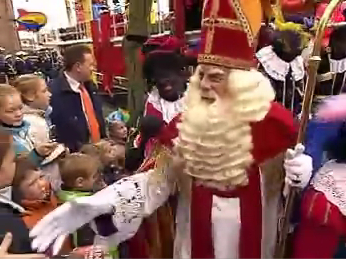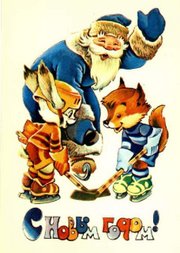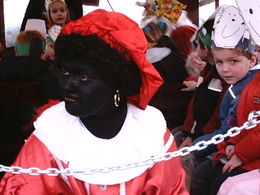Contents |
Christmas gift-bringers around the world
Europe and North America



Throughout Europe and North America, Santa Claus is generally known as such, but in some countries the gift-giver's name, attributes, date of arrival, and even identity varies.
- Austria: Christkind ("Christ child")
- Belgium: "Santa Claus", called Père Noël by French speakers and Kerstman("Christmas Man") by Flemish speakers, is celebrated on Christmas day;Sinterklaas for the Flemish speakers, Saint Nicholas for the French speakers is celebrated on December 6th and his a distinct character with a more religious, catholic touch.
- Bulgaria: Дядо Коледа (Dyado Koleda, "Grandfather Christmas"), with the Russian-borrowed version of Дядо Мраз (Dyado Mraz, "Grandfather Frost") being somewhat more widespread in Socialist times from the end of WWII until 1989 but generally out of favour nowadays
- Canada: Santa Clause (among English speakers); Le Père Noël ("Father Christmas"), among French speakers
- Croatia: Djed Božićnjak ("Grandfather Christmas"), used to be Djed Mraz (Grandfather Frost - Serbian term) before 1990, Mali Isus ("Baby Jesus"), Sveti Nikola ("Saint Nichlaus") bringing gifts or rod on December the 6th
- Czech Republic: Ježíšek (diminutive form of Ježíš ("Jesus"))
- Denmark: Julemanden
- Estonia: Jõuluvana ("Old man of Christmas")
- Finland: Joulupukki ("Yule Goat")
- France: Le Père Noël ("Father Christmas"); Père Noël is also the common figure in other French-speaking areas)
- Germany: Weihnachtsmann or Nikolaus ("Christmas Man"); Christkind in southern Germany
- Greece: Άγιος Βασίλης ("Saint Basil")
- Hungary: Mikulás ("Nicholas"); Jézuska or Kis Jézus ("child Jesus")
- Iceland: Jólasveinn. In Icelandic folktales, there are 13 Santa Clauses.
- Ireland: Daidí na Nollag ("Father Christmas") among Irish speakers
- Italy: Babbo Natale ("Father Christmas"); La Befana (similar role as Santa Claus; she rides a broomstick rather than a sleigh, although she is not normally considered a witch); Gesù Bambino ("Baby Jesus"); Santa Lucia (A child saint "operating" in the Northern regions, bringing gift on December the 12th. As well as the Befana, an old lady, comes out on the Epifany, Jan 6th)
- Latvia: Ziemassvētku vecītis
- Liechtenstein: Christkind
- Lithuania: Kalėdų Senelis
- Luxembourg: Klaussenhofer
- Macedonia: Dedo Mraz
- Netherlands "Santa Claus", called Kerstman ("Christmas Man"), is celebrated on Christmas day; Sinterklaas is celebrated on December 5th and his a distinct character with a more religious, catholic touch.
- Norway: Julenissen
- Poland: Święty Mikołaj / Mikołaj ("Saint Nicholas")
- Portugal: Pai Natal ("Father Christmas")
- Romania: Moş Crăciun ("Old Man Christmas")
- Russia: Дед Мороз (Ded Moroz, "Grandfather Frost")
- Scotland: Bodach na Nollaig (Scots Gaelic: Old Man of Christmas)
- Slovakia: Mikuláš
- Slovenia: Bozicek
- Spain: Papá Noel (Father Noel); the Tió de Nadal in Catalonia; Olentzero in the Basque Country. A more common and traditional christmas present-giving figure in Spain are "Los Reyes Magos" ("The Three Kings"; "Magi").
- Serbian: Deda Mraz (Grandfather Frost)
- Sweden: Jultomten ("The Yule/Christmas Gnome")
- Switzerland: Christkind
- Turkey: Noel Baba ("Father Noel")
- United Kingdom: Santa Claus, also known as Father Christmas though they were originally two quite different people, and Father Christmas did not originally bring gifts
- United States: Santa Claus; Kris Kringle; Saint Nicholas or Saint Nick
- Wales: Siôn Corn
Latin America
Santa Claus in Latin America is generally referred to with different names from country to country.
- Argentina: Papá Noel, El Niño Dios
- Brazil: Papai Noel
- Chile: Viejito Pascuero
- Colombia: El Niño Dios ("God child")
- Costa Rica: San Nicolás or Santa Clos
- Dominican Republic: Santa Clos/Papá Noe
- Ecuador: El Niño Dios ("God child"), Papá Noel
- Mexico: Santa Claus (pronounced "Santa Clos"); El Niño Dios ("God child," in reference to Jesus).
- Peru: Papá Noel
East Asia
People in East Asia, particularly countries that have adopted Western cultures, also celebrate Christmas and the gift-giver traditions passed down to them from the West.
- China: 圣诞老人
- Hong Kong: 聖誕老人 (literally 'The Old Man of Christmas')
- Indonesia: Santa Claus or Sinter Klass (from Netherland Pronunciation )
- Japan: サンタクロース (Santa Kuroosu, or Santa-san)
- Korea: 산타 클로스 (Santa Harabeoji, or "Grandfather Santa")
- Philippines: Santa Claus
- Taiwan: 聖誕老人 or 聖誕老公公 (both literally 'The Old Man of Christmas')
- Thailand: ซานตาคลอส (Santa Claus)
- Vietnam: Ông Già Nô-en (literally 'The Old Man of Christmas')
Central Asia
- India: ಸಾ೦ಟಾ ಕ್ಲಾಸ್ (in southern India)
- Tatarstan: Qış Babay/Кыш Бабай (Winter Grandfather)
- Uzbekistan: Qor Bobo (Snow Grandfather)
Africa and the Middle East
Christians in Africa and Middle East who celebrate Christmas generally ascribe to the gift-giver traditions passed down to them by Europeans in the late nineteenth and early twentieth century. Descendants of colonizers still residing in these regions likewise continue the practices of their ancestors.[1]
- Egypt: Baba Noel
- Iran: Baba Noel
- Israel: סנטה קלאוס
- South Africa: Sinterklaas; Father Christmas; Santa Claus
Oceania
- Australia: Father Christmas; Santa Claus
- New Zealand: Father Christmas; Santa Claus
See also: Christmas worldwide
Category: Santa Claus
